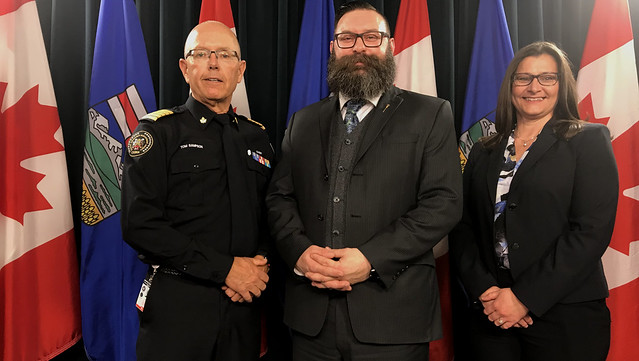This release was issued under a previous government.

L to R: Tom Sampson, chief, Calgary Emergency Management Agency, Minister Anderson and Ryna Brideau-Thombs, secretary, International Association of Emergency Managers Canada, after tabling amendments to the Emergency Management Act.
In the past 10 years, Alberta has seen an increasing number of natural disasters. Proposed amendments to the Emergency Management Act would update rules and regulations to help communities improve their response to disasters. It would also provide the ability to create a new Local Authority Emergency Management Regulation that would give clear direction on emergency management practices for municipalities to follow.
Starting in June, first responders, local elected officials, municipal directors of emergency management, Metis settlements and First Nations communities will be invited to provide feedback on the proposed changes and suggested regulation.
Government intends to further discuss this bill in the fall legislative session.
“In the face of past disasters our first responders have shown courage and bravery and our municipalities have pulled together to respond. The best way to protect Albertans from disasters is to be sure all of us are better prepared. I look forward to consulting on these proposed changes with the emergency management community to ensure that all levels of government are working together to protect Albertans.”
The Local Authority Emergency Management Regulation proposes additional direction for municipalities on training requirements, local emergency management plans and required use of the Incident Command System during emergencies. The regulation would also include mechanisms to support regional emergency management collaboration.
“Proposed updates to Alberta’s Emergency Management Act will help position emergency managers throughout the province to better prepare for, and respond to, emergencies and disasters. These changes recognize the necessity of regular training, which in turn builds capacity for local authorities, and enhances their ability to respond and promote community resilience.”
“Disasters in Alberta are becoming more frequent, intense and costly. Albertans, municipalities and the province must continue to work together to build capability, capacity and resilience – this legislation provides the foundational building blocks to accomplish that.”
After every major disaster, the province hires a third party to conduct an independent review of the emergency response. Recommendations made in these post-incident assessments, including the 2011 Slave Lake wildfires, the 2013 southern Alberta floods and the 2016 Wood Buffalo wildfires helped inform the proposed amendments, including the recommendations to improve and add to the Emergency Management Act made in the KMPG Fort McMurray wildfire report.
Other proposed changes to the act would:
- Protect first responders by clarifying their liability if individuals refuse to comply with an evacuation order.
- Provide clarity on the lead person authorized to act on the minister’s behalf during a state of emergency and include details on the power and authority given to the lead role.
- Clarify rules on how disputes over compensation are handled when property is damaged by the emergency response, not by the actual emergency.
The Emergency Management Act provides the legislative framework for local and provincial management and coordination efforts to prepare for, mitigate against, respond to and recover from emergencies and disasters.